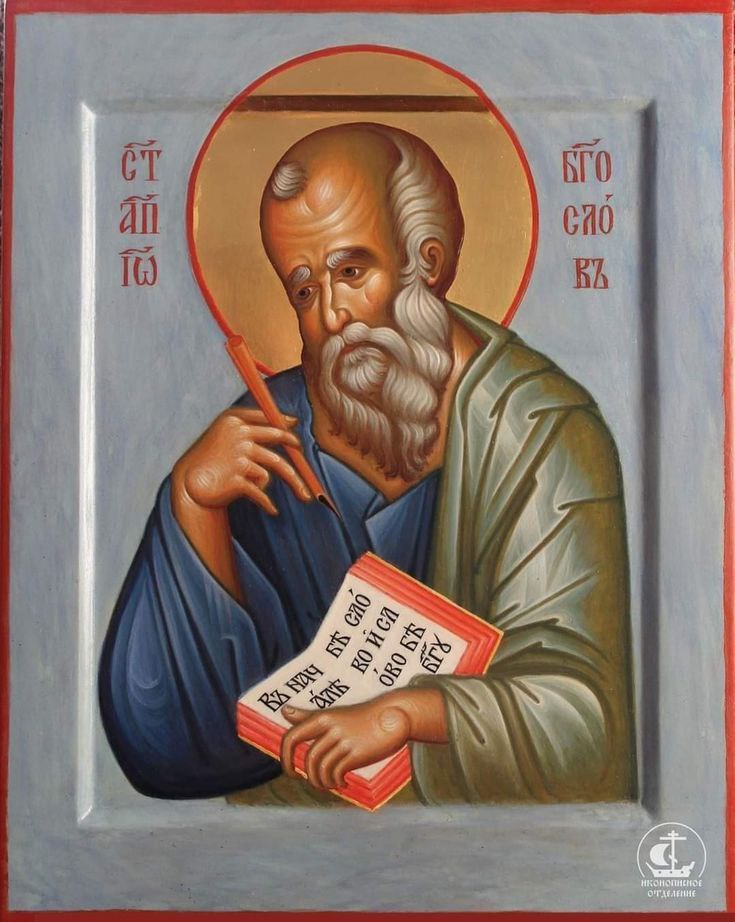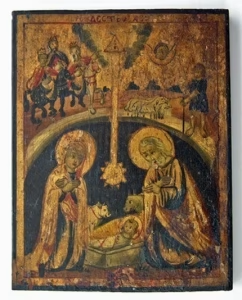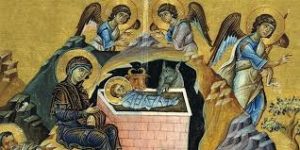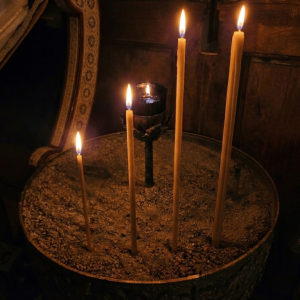On the Mystery of the Beloved Disciple./ On the life and falling-asleep in the Lord of the Holy Apostle John the Theologian

By Priest Aleksandar
“In the beginning was the Word, and the Word was with God,
and the Word was God.”
Behold, today we speak of the one who did not die,
of the one for whom death became sleep,
of the man who dwelt in the bosom of God
and listened to the heart of Eternity beating.
He was the beloved, not according to the flesh, but for the purity of his spirit.
He was the youngest among the apostles,
yet the first in understanding love.
For where the others beheld a wonder, he beheld the Face;
where the others questioned, he was silent
and in that silence he heard the secret that cannot be uttered.
Thus, from fisherman he became theologian,
from son of Zebedee a son of Light,
and from a man of earth an angel of love.
When the Lord entered Galilee and called the first disciples,
He said to him also, “Follow Me.”
And he left the nets and his father, and the boat, and the sea,
for he recognized in that voice the Voice above every voice,
the One who once said, “Let there be light.”
And there was light in his soul.
And when the Lord called him “son of thunder,”
it was not because he was tempestuous,
but because there lived in him the power of heaven
that scatters the darkness of human hearts.
But that thunder turned into quiet peace
when he laid his head upon the Lord’s breast.
For where man touches God,
there the lightning becomes prayer.
So from a zealot he became an apostle of gentleness,
and from storm he became the stillness that understands all.
And when the other disciples fled,
he alone remained at the Cross.
Fear did not kill love within him,
for perfect love casts out fear.
The world bows beneath the Cross,
and he stands as a pillar of faith and sorrow,
holding the Most Holy Theotokos as his own soul,
for it was said to him, “Son, behold your Mother.”
There a new heart was born within him the heart of the Church.
For from that hour he became the Guardian of the Mother,
and thereby the guardian of all who believe.
O wondrous marvel:
he who saw blood and water flow from the Lord’s side
first understood that from that blood the Church was born,
and from that water the baptism of all ages.
When the time of witness had passed,
and when others had written what they had seen,
he, like an eagle soaring above the clouds,
wrote what cannot be seen with eyes.
His Gospel did not begin in Bethlehem,
but in eternity:
“In the beginning was the Word, and the Word was with God,
and the Word was God.”
These words, as Saint Athanasius says,
“disperse the darkness of heresies as thunder scatters the clouds.”
For who would dare to say that the Son is a creature,
when the beloved disciple bore witness that He is
God of God, Light of Light?
In that Gospel there are no superfluous words:
all is like a flame that burns without consuming.
He did not write as a man who reports,
but as one who beholds,
for his beholding became theology.
When the world cast him out,
it was not separation but drawing near to God.
Banished to Patmos, amidst rocks and waves,
there he heard a voice like a trumpet,
and the face of the One who spoke to him was like the sun in its full strength.
And when he fell at His feet as one dead,
he heard the words: “Fear not; I am the First and the Last, and the Living One.”
And he saw the Church in glory like seven lampstands,
and the Lord among them, as Judge and as Victim.
Thus heaven and earth were opened before him,
and he saw the end of time as a man beholds the dawn:
not as terror, but as a return.
Saint Andrew of Caesarea says:
“Revelation is heaven opened to one man,
that all might know the doors are opened to love.”
Upon returning to Ephesus, John lived like an angel in the flesh.
His voice was gentle, but every word an arrow to the heart.
He did not teach his disciples with words,
but with a look and with silence.
And when he spoke, he always said the same thing:
“My little children, love one another.”
When they asked him, “Father, why do you repeat only this?”
he would answer,
“Because if you do this, it is enough for your salvation.”
Thus he became a living Gospel,
the flesh of love and the breath of the Spirit.
When his hour drew near,
he called his disciples and said,
“It is time for me to return to Him who sent me.
Dig for me a grave in the form of a Cross,
for my life has been Cross and joy.”
And they dug the place as he commanded.
He prayed, crossed his hands upon his chest, and said,
“Peace be with you.”
And he descended into the grave like a man going to rest,
and they covered him with earth, weeping and glorifying God.
But when they came the next day,
they opened the grave and found nothing.
Only the earth gave off a fragrance like myrrh,
and from it there arose a dust, white as snow,
which healed the sick and the infirm.
Thus was fulfilled the word of the Lord:
“If I will that he remain till I come, what is that to you?”
He did not die like the others,
for death has no power over love.
He was not taken up like Elijah,
for he was not a prophet of fire,
but a prophet of light.
He did not depart like Enoch,
for he was not hidden from men,
but was hidden within men.
He fell asleep in the Lord,
and became an invisible witness,
a keeper of time and an intercessor for the world.
Saint Theophylact says:
“He entered into the depth of God’s silence,
where words cease and only love remains.”
And Saint Chrysostom adds:
“He did not depart into death,
for he already lived,
as a candle does not go out in the sun.”
O beloved disciple,
your death is not an empty tomb,
but an open heaven.
Your silence is a word that does not cease,
your invisibility a presence that does not pass away.
For you who beheld the Glory of God
remain in the world as a light that restrains the darkness.
According to the tradition of certain holy and God-wise elders,
one may think that by your love and prayer
you are the one who restrains wrath and lawlessness;
yet the Church keeps reverent silence,
for the secret of love is not for dispute.
Perhaps your prayer keeps the heavens open,
and your tears still the tempests of the ages.
We do not know where you are, but we know that you are.
We do not see you, but we feel you
whenever love is quickened within us.
O man, if you would know John,
seek him not in books,
but in a heart that loves.
For where love is, there he is;
where peace is, there his spirit breathes;
where silence is, there his heart listens.
All that he wrote, he did not write with a pen,
but with tears and with light.
His Gospel is not paper, but heaven.
He is not a theologian because he spoke about God,
but because he beheld God,
and himself became the words of God’s love.
“God is love,” he wrote,
and with that he uttered the highest dogma.
For all that can be said of God
is contained in that one word.
Saint Athanasius says:
“John did not say ‘God has love,’
but ‘God is love,’
for love is not a work of God,
but His very being.”
Therefore, whoever loves already lives in God.
And whoever does not love is already separated from Him.
Thus in John all is fulfilled:
faith, hope, love and the greatest is love.
Lo, in the silence of night, when prayer becomes breath,
and when every thought is hushed,
it seems as though one hears the step of the gentle Apostle,
as he passes among souls and blesses.
He does not speak, yet his presence is fragrant like incense.
He is not seen, yet wherever he is,
wrath ceases, tears are dried, and peace enters the heart.
He has not gone away, for love does not depart.
And they did so.
John prayed, crossed his hands upon his chest,
and said, “Peace be with you.”
Then he descended into the grave like a man going to rest,
and they covered him with earth.
When they later returned,
they opened the grave and did not find the body,
but a fragrant dust
that to this day pours forth manna on the feast of his repose (May 8).
Thus were the Lord’s words fulfilled:
“If I will that he remain till I come.”
For no one knows where his body is,
nor has it decayed,
but rests in the glory of God.
Brethren,
let us not think that John’s mystery lies in the body,
but in love.
For he who loves God
abides in Him, and God in him.
(1 John 4:16)
So the beloved disciple did not remain in time,
but in love.
And so long as love exists in the world,
he remains.
For he bears witness that love never fails.
(1 Corinthians 13:8)
Therefore the Church does not weep for John,
but glorifies him as a living witness.
He has not ceased to be among us,
but has only left us in silence,
that we might seek him by love.
And today we confess:
Lord Jesus Christ,
grant us the heart of the beloved disciple,
to love without measure,
to be silent in peace,
and to abide in You until You come.
Amen.
With love in Christ,
Priest Aleksandar Radunovic





